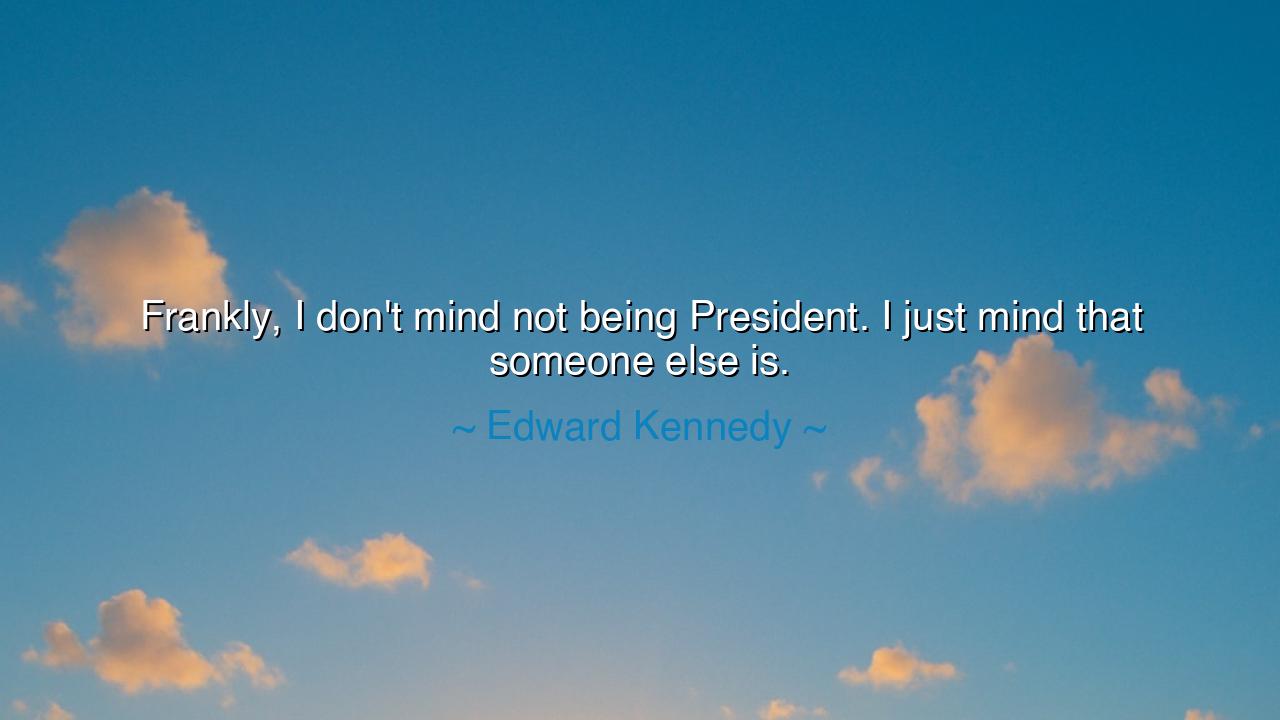
Frankly, I don't mind not being President. I just mind that






Edward Kennedy, the last great son of a dynasty, once confessed with disarming candor: “Frankly, I don’t mind not being President. I just mind that someone else is.” In these words lies the raw essence of ambition—not always the hunger for the crown itself, but the sting of watching another wear it. Kennedy reveals a truth ancient as kingship: power denied can be endured, but power granted to others wounds the pride more deeply than absence alone.
The origin of this saying rests in the shadow of the Kennedy legacy. Edward, younger brother to John and Robert, stood always within the orbit of greatness, yet never ascended to the White House. His 1980 bid for the presidency faltered against Jimmy Carter, leaving him forever the “Lion of the Senate,” but never the commander of the republic. His remark reflects both humor and grief—a jest that cloaks the pain of being near to destiny yet held from it.
History offers many mirrors. Consider Julius Caesar’s rival, Cato the Younger. Cato had no desire to rule Rome himself, preferring the austere life of philosophy and integrity. Yet when Caesar seized the mantle of power, Cato’s soul could not abide it. His anguish lay not in being denied the consulship, but in seeing a man he despised crowned with authority. Like Kennedy, his torment was not the absence of power in his own hand, but its presence in the hands of another.
This truth also dwells in the story of Alexander Hamilton, who never rose to the presidency. His genius built the financial system of America, his pen shaped its institutions, yet his ambition was forever checked. He might have endured his station, but to see rivals of lesser vision rise above him—Jefferson, Adams—drove him into bitter conflict. Kennedy’s jest echoes Hamilton’s fate: the pain of ambition is less in failing, and more in watching another succeed.
Therefore, O seekers of wisdom, take heed: the heart of ambition is a double-edged flame. It drives men to greatness, but it also consumes them when thrones pass into other hands. Kennedy’s words remind us that desire for power is not always about the office itself, but about the ache of seeing another occupy it. For the crown weighs less heavily on the brow than it does on the heart of the one who almost wore it.






QATran Quynh Anh
Kennedy’s statement seems to underline the deep frustration politicians may feel when they’re passed over for the highest office. It’s not that he wanted the job for the sake of prestige, but rather because someone else was in a position to shape the future. How does this reveal the tension between personal ambition and the sense of duty that comes with leadership? Does it change our perception of politicians when they express this kind of dissatisfaction?
MTMinh Trinh
Edward Kennedy’s quote taps into the idea of power and influence in politics. It seems to imply that he’d be content without the title of President, as long as someone he believes in is in charge. But could this be a reflection of the intense power struggle inherent in politics? How does this shape our expectations of political leaders—should they want the role out of personal ambition, or should it always be about service to the people?
LLMy Linh Le
Kennedy’s quote is an interesting expression of political frustration. It suggests that his concern isn’t necessarily about the prestige of being President but rather the consequences of someone else holding that office. Is this an indication that in politics, it’s not just about leadership but about who gets to steer the nation’s direction? Can political leaders ever truly be satisfied with a position if they’re not in the top role?
HNHuynh Nhu
There’s something quite human in Edward Kennedy’s quote. It reveals a deep, almost existential frustration that resonates with anyone who has ever worked toward something only to see someone else achieve it. Does this reflect a larger issue in political environments, where ambition sometimes drives decisions more than the actual benefits to the country? How does one reconcile personal ambitions with the needs of the greater good?
DLNguyen Duy Long
Kennedy’s remark makes me think about the complexity of ambition in politics. It’s almost as though he’s saying that the position of President is less important than the idea of someone else taking it. Could it be that the desire to lead is more about the power to shape the future than the actual role itself? How does this mindset impact the way politicians view their career paths?